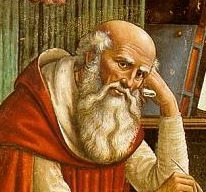It has been observed that what Professor Tolkien was doing with The Lord of the Rings and particularly with The Silmarillion was writing new mythology, crafting an English myth cycle, similar to those found in other cultures. Certainly, the charge seems to stick when looking at The Silmarillion (The Lord of the Rings seems to me to be another beast entirely--mostly because of the hobbits. Aragorn certainly belongs in a saga or myth, but Frodo and Sam seem out of place. This is, of course, the idea and is part of the genius behind the books). Even if Tolkien did not set out to create a new mythology, he was certainly well-versed in the legendary and literary tradition which he was pulling from (including names--Gandalf's comes from the Poetic Edda, a Norse cycle of myths). Likewise Jack Lewis pulled extensively from his own classical training in all of his fiction, from The Chronicles of Narnia up to Perelandra (Till We Have Faces is actually a retelling of a Greek myth. It isn't really a fantasy book, and so in some ways stands outside of this discussion. However, it deserves mentioning here, because it illustrates Jack's familiarity with the classical myths, as well as his willingness to use them in other contexts). Thus, Bacchus and Silenus and the Maenads accompany Aslan in Prince Caspian.
Fantasy has always drawn from mythology, but in many ways fantasy is like mythology's little brother. I was pondering about mythology the other day, because I have been tapped to possibly teach a course in Egyptian and Mesopotamian mythology. This excited me, of course, and I was thinking about how to approach mythology. One of the key points I came to was to remember that the ancients believed this stuff--more or less. It is interesting to us to tell stories about the battles between Horus and Set or the tale of Marduk overthrowing Gilgamesh or the divine infighting prolonging the Trojan War, but to us they are just stories. To those hearing these stories originally (for they would have all had an oral component, to be sure), these tales were on some level believed and treasured. It is difficult for us as moderns to know how much they believed them. We know that the Greeks had a long-standing tradition of allegoricizing their myths and their gods (a tradition which Christianity unfortunately inherited)--but we may never know whether or not the ancient Egyptians really believed that the sun was Amon-Re. There seems to have been some level of actual belief, or at least a willingness to spend massive amounts of time and resources to prepare for an afterlife.
So, at least one of the reasons that myths are so powerful is because of the belief of the cultures that produced as opposed to fantasy. Another, closely related reason is that these myths are deeper and more powerful than an individual may produce. An imagination, no matter how fertile, is not equal to the combined sub-conscious of an entire culture. Also, as many anthropological reader from James Frazer on have observed myths tend to visit and revisit the same themes the world over. In part this is because the human experience is at least, on certain levels, universal. However, from a more explicitly religious perspective, Jack Lewis suggested that these myths were planted by the Divine in order to point men toward their final home and destination--bringing us back full circle to the inherent longing for home which is such a part of the appeal of fantasy, as has been previously addressed. Myths represent some of mankind's strongest struggles to the divine, and so have a deep and compelling richness.
I love to read fantasy, but when reading fantasy, I like to look for those universals which underpin all stories--those myths undergirding reality, the true pillars of creation on beyond sight and mind.
I will leave you with a quotation (first learned from Jack Lewis) which taught me much of the meaning in myths:
I ween that I hung | on the windy tree,
Hung there for nights full nine;
With the spear I was wounded, | and offered I was
To Othin, myself to myself,
On the tree that none | may ever know
What root beneath it runs.
The Prose Edda, Hovamal, (Bellows translation)

